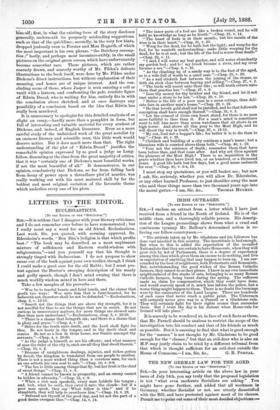LETTERS TO THE EDITOR.
ECOLESIASTICUS.
[TO THE EDITOR OP THE "SPECTATOR."] Stu,—It is seldom that I disagree with your literary criticisms, and I do not remember ever before to have remonstrated ; but I really must say a word for an old friend, Ecclesiasticus. Last week, Sir, you quoted, with seeming approval, Dr. Edersheim's words, " Ben Sira's [religion is that which profits best :" " The book may be described as a most unpleasant mixture of selfishness and Eastern world-wisdom with religiousness,"—and you yourself say that his thought is strongly tinged with Saduceeism. I do not propose to show cause out of the book against your own verdict, though I think I could make a good case for the old Rabbi ; but I must pro- test against the Doctor's sweeping description of his manly and godly speech, though I don't mind owning that there is much worldly wisdom mixed in here and there.
Take a few samples of his proverbs :-
" Woe be to fearful hearts and faint hands, and the sinner that goeth two ways ! Woe unto him that is faint-hearted, for he believeth not, therefore shall he not be defended."—Ecclesiasticus, chap. 2, v. 12-13.
" Search riot the things that are above thy strength, for it is not needful for thee to see the things that are in secret. Be not curious in unnecessary matters, for more things are showed unto thee than men understand."—Ecclesiasticus, chap. 3, v. 22-23.
" There is a shame that bringeth sin ; and there is a shame that is glory and grace."—Chap. 4, v. 21.
" Strive for the truth unto death, and the Lord shall fight for thee. Be not hasty in thy tongue, and in thy deeds slack and remiss. Be not as a lion in thine house, nor frantic amongst thy servants."—Chap. 4, v. 28-30.
" As the judge is himself, so are his officers ; and what manner of man the ruler of the city is, such are all they that dwell therein." —Chap. 10, v. 2. " Because of unrighteous dealings, injuries, and riches gotten by deceit, the kingdom is translated from one people to another. There is not a more wicked thing than a covetous man, for such an one setteth his own soul to sale."—Chap. 10, v. 8-9. " The bee is little among things that fly, but her fruit is the chief of sweet things."—Chap. 11, v. 3. "A friend cannot be known in prosperity, and an enemy cannot be hidden in adversity."—Chap. 12, v. 8. " When a rich man speaketh, every man holdeth his tongue ; and, look, what he midi, they extol it unto the clouds but if a poor man speak, they say What fellow is this ?' and if he stumbleth, they will help to overthrow him."—Chap. 13, v. 23.
"Defraud not thyself of the good day, and let not the part of a good desire overpass thee."—Chap. 14, v. 14.
"The inner parts of a fool are like a broken vessel, and he will hold no knowledge as long as he liveth."—Chap. 21, v. 14. " The heart of fools is in their mouth; but the mouth of the wise is in their heart."—Chap. 21, v. 26. " Weep for the dead, for he hath lost the light; and weep for the fool, for he wanteth understanding: make little weeping for the dead, for he is at rest ; but the life of the fool is worse than death." —Chap. 22, v. 11. " I said, I will water my best garden, and will water abundantly my garden bed; and lo ! my brook became a river, and my river became a sea."—Chap. 4, v. 31. " As the climbing up of a sandy way is to the foot of the aged, so is a wife full of words to a quiet man."—Chap. 25, v. 20. " As a nail sticketh fast between the joining of the stones, se doth sin stick close between buying and selling."—Chap. 27, v. 2. " The birds will resort unto their like ; so will truth return unto- them that practise her."—Chap. 27, v. 9. " Lose thy money for thy brother and thy friend, and let it not rust under a stone to be lost."—Chap. 29, v. 10. " Better is the life of a poor man in a mean cottage, than deli- cate fare in another man's house."—Chap. 29, v. 22. "He that loveth gold shall not be justified, and he that followeth corruption shall have enough thereof."—Chap. 31, v. 5. "Let the counsel of thine own heart stand, for there is no man more faithful to thee than it. For a man's mind is sometimes wont to tell him more than seven watchmen that sit above in an high tower. And above all this pray to the Most High, and he will direct thy way in truth."—Chap. 37, v. 13-15. " My son, lead not a beggar's life ; for better it is to die than to- beg."—Chap. 40, v. 28. " Children and building of a city continue a man's name ; but a blameless wife is counted above them both."—Chap. 40, v. 19.
" Fear not the sentence of death; remember them that have been before thee, and that come after. And why art thou against the pleasure of the Most High ? There is no inquisition in the grave whether thou have lived ten, or an hundred, or a thousand_ years. A good life bath but few days, but a good name endureth for ever."—Chap. 41, v. 3-4, 13.
I must stop my quotations, or you will basket me ; but now I ask, Sir, seriously, whether you will allow Dr. Edersheim, or any other learned Professor, to just shoulder away the man who said these things more than two thousand years ago into the moral gutter.—I am, Sir, &c., THOMAS HUGHES.


































 Previous page
Previous page